英文诗歌赏析
适合当睡前读物的经典优美英文诗歌赏析
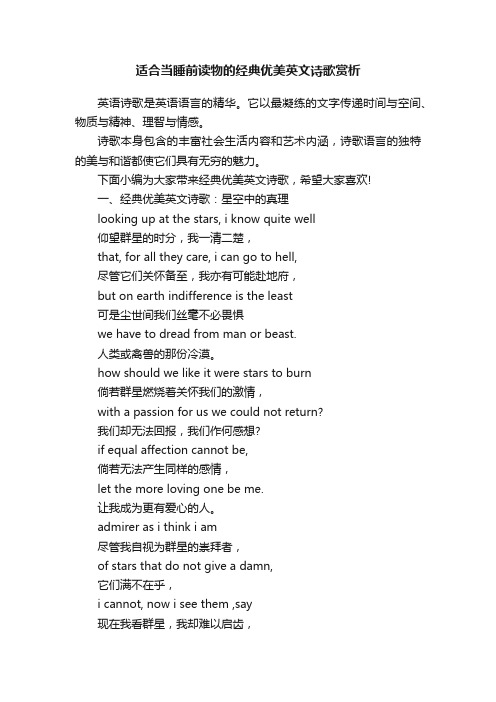
适合当睡前读物的经典优美英文诗歌赏析英语诗歌是英语语言的精华。
它以最凝练的文字传递时间与空间、物质与精神、理智与情感。
诗歌本身包含的丰富社会生活内容和艺术内涵,诗歌语言的独特的美与和谐都使它们具有无穷的魅力。
下面小编为大家带来经典优美英文诗歌,希望大家喜欢!一、经典优美英文诗歌:星空中的真理looking up at the stars, i know quite well仰望群星的时分,我一清二楚,that, for all they care, i can go to hell,尽管它们关怀备至,我亦有可能赴地府,but on earth indifference is the least可是尘世间我们丝毫不必畏惧we have to dread from man or beast.人类或禽兽的那份冷漠。
how should we like it were stars to burn倘若群星燃烧着关怀我们的激情,with a passion for us we could not return?我们却无法回报,我们作何感想?if equal affection cannot be,倘若无法产生同样的感情,let the more loving one be me.让我成为更有爱心的人。
admirer as i think i am尽管我自视为群星的崇拜者,of stars that do not give a damn,它们满不在乎,i cannot, now i see them ,say现在我看群星,我却难以启齿,i missed one terribly all day.说我成天思念一颗星星。
were all stars to disappear or die倘若所有的星星消失或者消亡,i should learn to look at an empty sky我应该学会仰望空荡的天空,and feel its total dark sublime,同时感受天空一片漆黑的崇高,though this might take me a little time.虽然这样可能要花费一点时间。
关于泰戈尔英文诗歌赏析
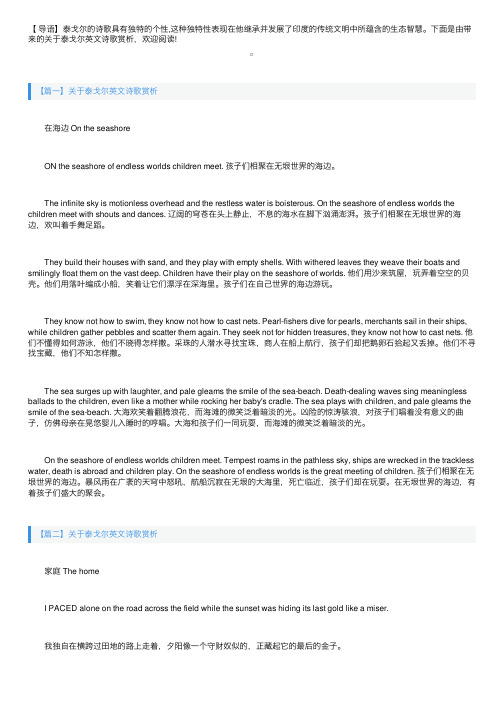
【导语】泰⼽尔的诗歌具有独特的个性,这种独特性表现在他继承并发展了印度的传统⽂明中所蕴含的⽣态智慧。
下⾯是由带来的关于泰⼽尔英⽂诗歌赏析,欢迎阅读!【篇⼀】关于泰⼽尔英⽂诗歌赏析 在海边 On the seashore ON the seashore of endless worlds children meet. 孩⼦们相聚在⽆垠世界的海边。
The infinite sky is motionless overhead and the restless water is boisterous. On the seashore of endless worlds the children meet with shouts and dances. 辽阔的穹苍在头上静⽌,不息的海⽔在脚下汹涌澎湃。
孩⼦们相聚在⽆垠世界的海边,欢叫着⼿舞⾜蹈。
They build their houses with sand, and they play with empty shells. With withered leaves they weave their boats and smilingly float them on the vast deep. Children have their play on the seashore of worlds. 他们⽤沙来筑屋,玩弄着空空的贝壳。
他们⽤落叶编成⼩船,笑着让它们漂浮在深海⾥。
孩⼦们在⾃⼰世界的海边游玩。
They know not how to swim, they know not how to cast nets. Pearl-fishers dive for pearls, merchants sail in their ships, while children gather pebbles and scatter them again. They seek not for hidden treasures, they know not how to cast nets. 他们不懂得如何游泳,他们不晓得怎样撒。
经典英文诗歌赏析(全)
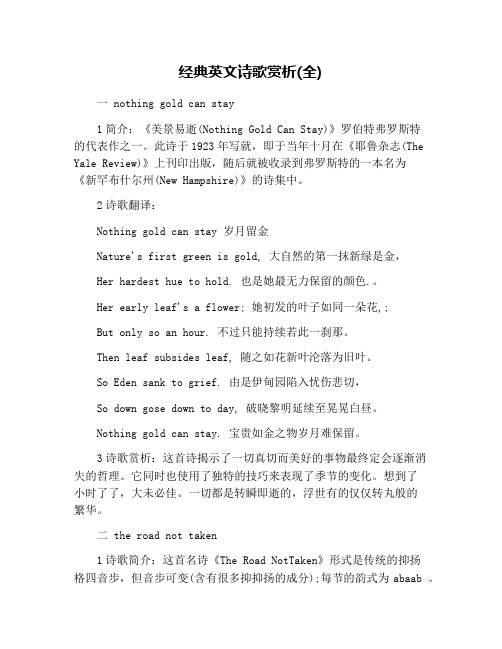
经典英文诗歌赏析(全)一 nothing gold can stay1简介:《美景易逝(Nothing Gold Can Stay)》罗伯特弗罗斯特的代表作之一。
此诗于1923年写就,即于当年十月在《耶鲁杂志(The Yale Review)》上刊印出版,随后就被收录到弗罗斯特的一本名为《新罕布什尔州(New Hampshire)》的诗集中。
2诗歌翻译:Nothing gold can stay 岁月留金Nature's first green is gold, 大自然的第一抹新绿是金,Her hardest hue to hold. 也是她最无力保留的颜色.。
Her early leaf's a flower; 她初发的叶子如同一朵花,;But only so an hour. 不过只能持续若此一刹那。
Then leaf subsides leaf, 随之如花新叶沦落为旧叶。
So Eden sank to grief. 由是伊甸园陷入忧伤悲切,So down gose down to day, 破晓黎明延续至晃晃白昼。
Nothing gold can stay. 宝贵如金之物岁月难保留。
3诗歌赏析:这首诗揭示了一切真切而美好的事物最终定会逐渐消失的哲理。
它同时也使用了独特的技巧来表现了季节的变化。
想到了小时了了,大未必佳。
一切都是转瞬即逝的,浮世有的仅仅转丸般的繁华。
二 the road not taken1诗歌简介:这首名诗《The Road NotTaken》形式是传统的抑扬格四音步,但音步可变(含有很多抑抑扬的成分);每节的韵式为abaab 。
弗罗斯特写诗的特色就是善于使用眼前看似平淡无奇的事物,去表达一个深刻的哲理。
这正如他在一首诗中写的:“黄色的树林里有两条岔开的路/可惜我不能在同一时间走两条路/我选择了少人行走的那条/这就造成了一切的差异。
”诗人选择了诗歌,放下了在一所师范学校教书的职业以及那可能平坦,安稳的生活。
英语诗歌及翻译赏析3篇
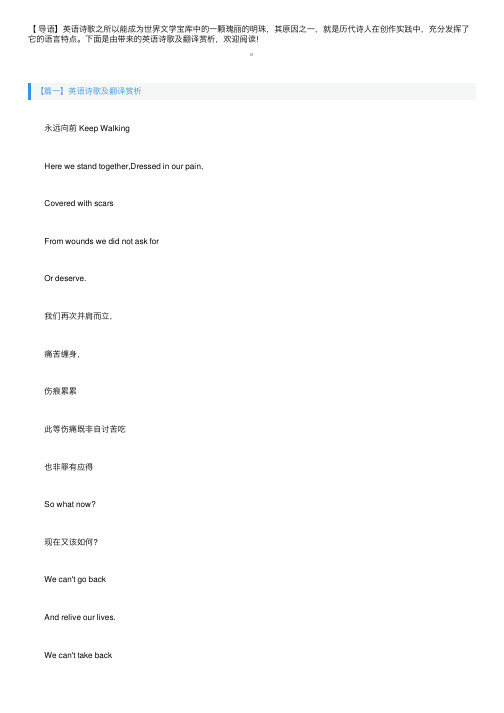
【导语】英语诗歌之所以能成为世界⽂学宝库中的⼀颗瑰丽的明珠,其原因之⼀,就是历代诗⼈在创作实践中,充分发挥了它的语⾔特点。
下⾯是由带来的英语诗歌及翻译赏析,欢迎阅读!【篇⼀】英语诗歌及翻译赏析 永远向前 Keep Walking Here we stand together,Dressed in our pain, Covered with scars From wounds we did not ask for Or deserve. 我们再次并肩⽽⽴, 痛苦缠⾝, 伤痕累累 此等伤痛既⾮⾃讨苦吃 也⾮罪有应得 So what now? 现在⼜该如何? We can't go back And relive our lives. We can't take back The innocence we lost Or make the sadness we felt Into happiness 我们⽆法回到过去 重启⼈⽣。
我们⽆法找回 早已失去的纯真 或将我们的悲伤 变为欢乐。
【篇⼆】英语诗歌及翻译赏析 If 如果 If you can keep your head when all about you, 如果所有⼈都失去理智,咒骂你, Are losing theirs and blaming it on you; 你仍能保持头脑清醒; If you can trust yourself when all men doubt you, 如果所有⼈都怀疑你, But make allowance for their doubting too; 你仍能坚信⾃⼰,让所有的怀疑动摇; If you can wait and not be tired by waiting, 如果你要等待,不要因此厌烦, Or, being lied about,don’t deal in lies, 为⼈所骗,不要因此骗⼈, Or, being hated, don’t give way to hating, 为⼈所恨,不要因此抱恨, And yet don’t look too good, nor talk too wise; 不要太乐观,不要⾃以为是; If you can dream — and not make dreams your master; 如果你是个追梦⼈——不要被梦主宰; If you can think — and not make thoughts your aim; 如果你是个爱思考的⼈——光想会达不到⽬标; If you can meet with triumph and disaster. 如果你遇到骄傲和挫折。
初中英文诗歌带翻译赏析

初中英文诗歌带翻译赏析【篇一】初中英文诗歌带翻译赏析A Coatby William Butler YeatsI made my song a coatCovered with embroideriesOut of old mythologiesFrom heel to throat;But the fools caught it,Wore it in the world’s eyesAs though they’d wrought it.Song, let them take it,For there’s more enterpriseIn walking naked.外套威廉?巴特勒?叶芝(着)我用古老的神话作为衣料,为我的歌缝制一件外套,上面铺满刺绣,层层秘密,从头到脚;可是愚蠢的人们把它夺去,穿起来在世人面前炫耀,似乎是他们亲手织造。
让他们拿走吧,歌啊,没有衣服更好,因为裸体行走,需要胆识更加高超。
【篇二】初中英文诗歌带翻译赏析初恋的感觉I never was struck before that hourWith love so sudden and so sweetHer face it bloomed like a sweet flowerAnd stole my heart way completeMy face turned pale as dealy paleMy legs refused to walk awayAnd when she looked” what could I ail?”.My life and all seemed turned to clay.我在这之前从未如此之震惊这份爱情是如此的突然如此的甜蜜她的脸庞像一朵盛开的鲜花将我的心儿全部个的偷走了我的脸颊变得像死者似地苍白我的腿再也迈步不出任何步伐但当她看我的时候我怎能感到丝毫的痛苦我的生命以及一切都变的犹如黄土And took my eyesight qyite away.The trees and bushes round the place Seemed midnight at noonday.I could not see a single thing.Words from my eyes did start.They spoke as chords do from the string 将我的视线缓缓的离开绿树与灌木环绕着这里午夜犹如白日我看不见别的什么了我的双目在诉说这话语一如丝弦上的妙音And blood burnt round my heart.Are flowers the winter’s choice?Is love’s bed always snow?She seemed to hear my silent voiceAnd love’s appeals to know.I never saw so sweet a face.As that I stood before.My heart has left its dwelling place And can return on more.我的心中的沸腾的血液燃烧成灰难道爱的冰床只是白雪?她似乎听到了无声的诉求这份爱渴望得到她的回应因为我从未见过如此甜美的脸庞我像以前一样站着我的心已离开了躯体永无归期【篇三】初中英文诗歌带翻译赏析Failure doesn’t mean you are a failure,It does mean you haven’t succeeded yet.Failure doesn’t mean you have accomplished nothing,It does mean you have learned something.Failure doesn’t mean you have been a fool,It does mean you had a lot of faith.Failure doesn’t mean you’ ve been disgraced,It does mean you were willing to try.Failure doesn’t mean you don’t have it,It does mean you have to do something in a different way.Failure doesn’t mean you are inferior,It does mean you are not perfect.Failure doesn’t mean you’ve wasted your life, It does mean you have a reason to start afresh.Failure doesn’t mean you should give up,It does mean you must try harder.Failure doesn’t mean you’ll never make it, It does mean it will take a little longer. Failure doesn’t mean God has abandoned you, It does mean God has a better idea.失败并不代表你是个失败者,它只表明你尚未成功。
英文诗歌及翻译赏析
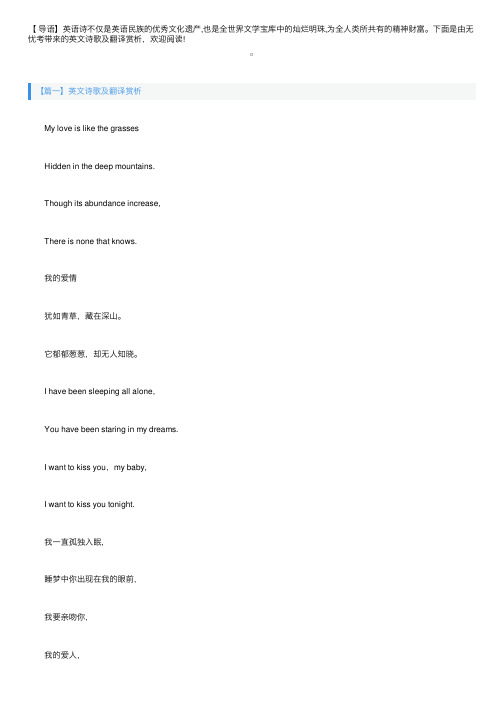
【导语】英语诗不仅是英语民族的优秀⽂化遗产,也是全世界⽂学宝库中的灿烂明珠,为全⼈类所共有的精神财富。
下⾯是由⽆忧考带来的英⽂诗歌及翻译赏析,欢迎阅读!【篇⼀】英⽂诗歌及翻译赏析 My love is like the grasses Hidden in the deep mountains. Though its abundance increase, There is none that knows. 我的爱情 犹如青草,藏在深⼭。
它郁郁葱葱,却⽆⼈知晓。
I have been sleeping all alone, You have been staring in my dreams. I want to kiss you,my baby, I want to kiss you tonight. 我⼀直孤独⼊眠, 睡梦中你出现在我的眼前, 我要亲吻你, 我的爱⼈, 今夜我就要亲吻你。
My love, You are like a flower, So sweet and pure and fair. 我的爱⼈, 你就像⼀朵鲜花, 那么甜蜜、纯洁⽽秀雅。
I just can’t believe the loveliness of loving you. I just can’t believe the one to love this feeling,too. I now know how sweet a kiss could be. Like the summer sunshine, Your sweetness over me. 我简直不敢相信, 爱你是如此地美好。
我不敢相信你也有如此感觉。
我现在才明⽩吻原是那么甜蜜, 就像夏⽇的阳光,包含着你对我的柔情蜜意。
I shall do one thing in this life, One thing certain,that is: Love you,Long for you, And keep wanting you till I die. 我这⼀⽣要做的⼀件事情, 绝对要做的⼀件事情,那就是: 爱你,想你,追求你,直到死。
英文诗歌鉴赏方法与技巧
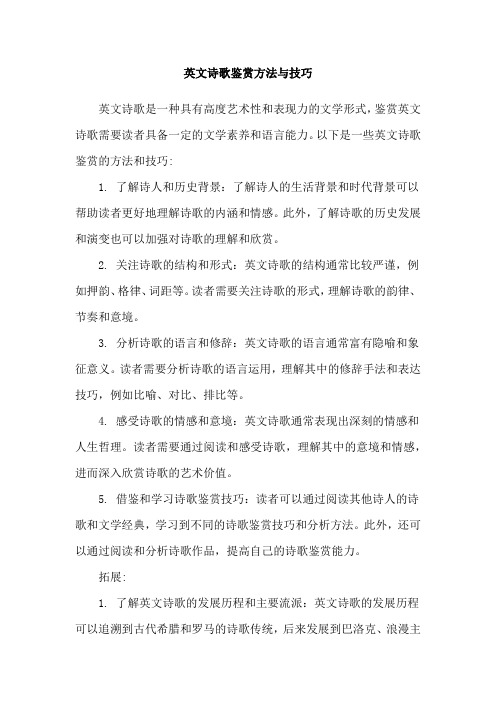
英文诗歌鉴赏方法与技巧英文诗歌是一种具有高度艺术性和表现力的文学形式,鉴赏英文诗歌需要读者具备一定的文学素养和语言能力。
以下是一些英文诗歌鉴赏的方法和技巧:1. 了解诗人和历史背景:了解诗人的生活背景和时代背景可以帮助读者更好地理解诗歌的内涵和情感。
此外,了解诗歌的历史发展和演变也可以加强对诗歌的理解和欣赏。
2. 关注诗歌的结构和形式:英文诗歌的结构通常比较严谨,例如押韵、格律、词距等。
读者需要关注诗歌的形式,理解诗歌的韵律、节奏和意境。
3. 分析诗歌的语言和修辞:英文诗歌的语言通常富有隐喻和象征意义。
读者需要分析诗歌的语言运用,理解其中的修辞手法和表达技巧,例如比喻、对比、排比等。
4. 感受诗歌的情感和意境:英文诗歌通常表现出深刻的情感和人生哲理。
读者需要通过阅读和感受诗歌,理解其中的意境和情感,进而深入欣赏诗歌的艺术价值。
5. 借鉴和学习诗歌鉴赏技巧:读者可以通过阅读其他诗人的诗歌和文学经典,学习到不同的诗歌鉴赏技巧和分析方法。
此外,还可以通过阅读和分析诗歌作品,提高自己的诗歌鉴赏能力。
拓展:1. 了解英文诗歌的发展历程和主要流派:英文诗歌的发展历程可以追溯到古代希腊和罗马的诗歌传统,后来发展到巴洛克、浪漫主义和现代诗歌等主要流派。
了解这些历史背景和流派可以帮助读者更好地理解英文诗歌的文化背景和艺术特色。
2. 关注英文诗歌的文学价值和意义:英文诗歌是一种具有高度文学价值和艺术价值的诗歌形式。
读者可以通过阅读和研究英文诗歌,了解和感受诗歌在人类文化史上的重要性和影响力。
3. 欣赏英文诗歌的韵律和美感:英文诗歌的韵律和美感是其独特的艺术特色之一。
读者可以通过练习朗诵和欣赏英文诗歌,感受到英文诗歌的韵律和美感,进而更好地理解和欣赏英文诗歌。
赏析英文诗歌的四种方法
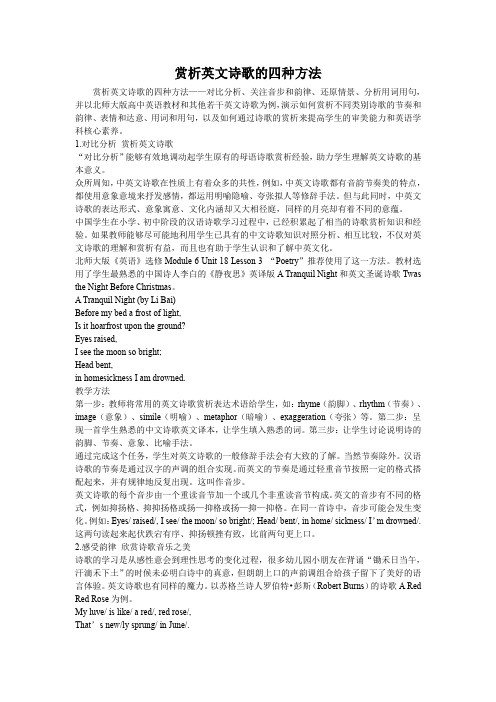
赏析英文诗歌的四种方法赏析英文诗歌的四种方法——对比分析、关注音步和韵律、还原情景、分析用词用句,并以北师大版高中英语教材和其他若干英文诗歌为例,演示如何赏析不同类别诗歌的节奏和韵律、表情和达意、用词和用句,以及如何通过诗歌的赏析来提高学生的审美能力和英语学科核心素养。
1.对比分析赏析英文诗歌“对比分析”能够有效地调动起学生原有的母语诗歌赏析经验,助力学生理解英文诗歌的基本意义。
众所周知,中英文诗歌在性质上有着众多的共性,例如,中英文诗歌都有音韵节奏美的特点,都使用意象意境来抒发感情,都运用明喻隐喻、夸张拟人等修辞手法。
但与此同时,中英文诗歌的表达形式、意象寓意、文化内涵却又大相径庭,同样的月亮却有着不同的意蕴。
中国学生在小学、初中阶段的汉语诗歌学习过程中,已经积累起了相当的诗歌赏析知识和经验。
如果教师能够尽可能地利用学生已具有的中文诗歌知识对照分析、相互比较,不仅对英文诗歌的理解和赏析有益,而且也有助于学生认识和了解中英文化。
北师大版《英语》选修Module 6 Unit 18 Lesson 3 “Poetry”推荐使用了这一方法。
教材选用了学生最熟悉的中国诗人李白的《静夜思》英译版A Tranquil Night和英文圣诞诗歌Twas the Night Before Christmas。
A Tranquil Night (by Li Bai)Before my bed a frost of light,Is it hoarfrost upon the ground?Eyes raised,I see the moon so bright;Head bent,in homesickness I am drowned.教学方法第一步:教师将常用的英文诗歌赏析表达术语给学生,如:rhyme(韵脚)、rhythm(节奏)、image(意象)、simile(明喻)、metaphor(暗喻)、exaggeration(夸张)等。
- 1、下载文档前请自行甄别文档内容的完整性,平台不提供额外的编辑、内容补充、找答案等附加服务。
- 2、"仅部分预览"的文档,不可在线预览部分如存在完整性等问题,可反馈申请退款(可完整预览的文档不适用该条件!)。
- 3、如文档侵犯您的权益,请联系客服反馈,我们会尽快为您处理(人工客服工作时间:9:00-18:30)。
英文诗歌赏析安全B103班峥201010044323Anaiysis on the poem of------The most distant way in the worldPoet:TagoreThe most distant way in the worldis not the way from birth to the end.It is when I sit near youthat you don’t understand I lov e you.The most distant way in the worldis not that you’re not sure I love you.It is when my love is bewildering the soulbut I can’t speak it outThe most distant way in the worldis not that I can’t say I love you.It is after looking into my heartI can’t change my love.The most distant way in the worldis not that I’m loving you.It is in our lovewe are keeping between the distance.The most distant way inthe worldis not the distance across us.It is when we’re breaking through the waywe deny the existance of love.So the most distant way in the worldis not in two distant trees.It is the same rooted branchescan’t enjoy the co-existance.So the most distant way in the worldis not in the being sepearated branches.It is in the blinking starsthey can’t burn the light.So the most distant way in the worldis not the burning stars.It is after the lightthey can’t be seen from afar.So the most distant way in the worldis not the light that is fading away.It is the coincidence of usis not supposed for the love.So the most distant way in the worldis the love between the fish and bird.One is flying at the sky,the other is looking upon into the sea.Rabindranath Tagore (1861-1941) was the youngest son of Debendranath Tagore, a leader of the Brahmo Samaj, which was a new religious sect in nineteenth-century Bengal and which attempted a revival of the ultimate monistic basis of Hinduism as laid down in the Upanishads. He was educated at home; and although at seventeen he was sent to England for formal schooling, he did not finish his studies there. In his mature years, in addition to his many-sided literary activities, he managed the family estates, a project which brought him into close touch with common humanity and increased his interest in social reforms. He also started an experimental school at Shantiniketan where he tried his Upanishadic ideals of education. From time to time he participated in the Indian nationalist movement, though in his own non-sentimental and visionary way; and Gandhi, the political father of modern India, was his devoted friend. Tagore was knighted by the ruling British Government in 1915, but within a few years he resigned the honour as a protest against British policies in India.Tagore had early success as a writer in his native Bengal. With his translations of some of his poems he became rapidly known in the West. In fact his fame attained a luminous height, taking him across continents on lecture tours and tours of friendship. For the world he became the voice of India's spiritual heritage; and for India, especially for Bengal, he became a great living institution.Although Tagore wrote successfully in all literary genres, he was first of all a poet. Among his fifty and odd volumes of poetry are Manasi (1890) [The Ideal One], Sonar Tari (1894) [The Golden Boat], Gitanjali (1910) [Song Offerings], Gitimalya (1914) [Wreath of Songs], and Balaka (1916) [The Flight of Cranes]. The English renderings of his poetry, which include The Gardener (1913), Fruit-Gathering (1916), and The Fugitive (1921), do not generally correspond to particular volumes in the originalBengali; and in spite of its title, Gitanjali: Song Offerings (1912), the most acclaimed of them, contains poems from other works besides its namesake. Tagore's major plays are Raja (1910) [The King of the Dark Chamber], Dakghar (1912) [The Post Office], Achalayatan (1912) [The Immovable], Muktadhara (1922) [The Waterfall], and Raktakaravi (1926) [Red Oleanders]. He is the author of several volumes of short stories and a number of novels, among them Gora (1910), Ghare-Baire (1916) [The Home and the World], and Yogayog (1929) [Crosscurrents]. Besides these, he wrote musical dramas, dance dramas, essays of all types, travel diaries, and two autobiographies, one in his middle years and the other shortly before his death in 1941. Tagore also left numerous drawings and paintings, and songs for which he wrote the music himself.From Nobel Lectures, Literature 1901-1967, Editor Horst Frenz, Elsevier Publishing Company, Amsterdam, 1969This autobiography/biography was written at the time of the award and first published in the book series Les Prix Nobel. It was later edited and republished in Nobel Lectures. To cite this document, always state the source as shown above.Rabindranath Tagore died on August 7, 1941.Greatest writer in modern Indian literature, Bengali poet, novelist, educator, and an early advocate of Independence for India. Tagaore won the Nobel Prize for Literature in 1913. Two years later he was awarded the knighthood, but he surrendered it in 1919 as a protest against the Massacre of Amritsar, where British troops killed some 400 Indian demonstrators. Tagore's influence over Gandhi and the founders of modern India was enormous, but his reputation in the West as a mystic has perhaps mislead his Western readers to ignore his role as a reformer and critic of colonialism. "When one knows thee, then alien there is none, then no door is shut. Oh, grant me my prayer that I may never lose touch of the one in the play of the many." (from Gitanjali)Rabindranath Tagore was born in Calcutta into a wealthy and prominent family. His father was Maharishi Debendranath Tagore, a religious reformer and scholar. His mother, Sarada Devi, died when Tagore was very young - he realized that she will never come back was when her body was carried through a gate to a place where it was burned. Tagore's grandfather had established a huge financial empire for himself. He helped a number of public projects, such as Calcutta Medical College.The Tagores tried to combine traditional Indian culture with Western ideas; all thechildren contributed significantly to Bengali literature and culture. However, in My Reminiscences Tagore mentions that it was not until the age of ten when he started to use socks and shoes. And servants beat the children regularly. Tagore, the youngest, started to compose poems at the age of eight. Tagore's first book, a collection of poems, appeared when he was 17; it was published by Tagore's friend who wanted to surprise him.Tagore received his early education first from tutors and then at a variety of schools. Among them were Bengal Academy where he studied history and culture. At University College, London, he studied law but left after a year - he did not like the weather. Once he gave a beggar a cold coin - it was more than the beggar had expected and he returned it. In England Tagore started to compose the poem 'Bhagna Hridaj' (a broken heart).In 1883 Tagore married Mrinalini Devi Raichaudhuri, with whom he had two sons and three daughters. In 1890 Tagore moved to East Bengal (now Bangladesh), where he collected local legends and folklore. Between 1893 and 1900 he wrote seven volumes of poetry, including SONAR TARI (The Golden Boat), 1894 and KHANIKA, 1900. This was highly productive period in Tagore's life, and earned him the rather misleading epitaph 'The Bengali Shelley.' More important was that Tagore wrote in the common language of the people. This also was something that was hard to accept among his critics and scholars.Tagore was the first Indian to bring an element of psychological realism to his novels. Among his early major prose works are CHOCHER BALI (1903, Eyesore) and NASHTANIR (1901, The Broken Nest), published first serially. Between 1891 and 1895 he published forty-four short stories in Bengali periodical, most of them in the monthly journal Sadhana.Especially Tagore's short stories influenced deeply Indian Literature. 'Punishment', a much anthologized work, was set in a rural village. It describes the oppression of women through the tragedy of the low-caste Rui family. Chandara is a proud, beautiful woman, "buxom, well-rounded, compact and sturdy," her husband, Chidam, is a farm-laborer, who works in the fields with his brother Dukhiram. One day when they return home after whole day of toil and humiliation, Dukhiram kills in anger his sloppy and slovenly wife because his food was not ready. To help his brother, Chidam's tells to police that his wife struck her sister-in-law with the farm-knife. Chandara takes the blame on to herself. 'In her thoughts, Chandara was saying to her husband, "I shall give my youth to the gallows instead of you. My final ties in this life will be with them."' Afterwards both Chidam and Dukhiram try to confess that they were quilty but Chandara is convicted. Just before the hanging, the doctor says that her husband wants to see her. "To hell with him," says Chandara.In 1901 Tagore founded a school outside Calcutta, Visva-Bharati, which wasdedicated to emerging Western and Indian philosophy and education. It become a university in 1921. He produced poems, novels, stories, a history of India, textbooks, and treatises on pedagogy. Tagore's wife died in 1902, next year one of his daughters died, and in 1907 Tagore lost his younger son.Tagore's reputation as a writer was established in the United States and in England after the publication of GITANJALI: SONG OFFERINGS, about divine and human love. The poems were translated into English by the author himself. In the introduction from 1912 William Butler Yates wrote: "These lyrics - which are in the original, my Indians tell me, full of subtlety of rhythm, of untranslatable delicacies of colour, of metrical invention - display in their thought a world I have dreamed of all my life long." Tagore's poems were also praised by Ezra Pound, and drew the attention of the Nobel Prize committee. "There is in him the stillness of nature. The poems do not seem to have been produced by storm or by ignition, but seem to show the normal habit of his mind. He is at one with nature, and finds no contradictions. And this is in sharp contrast with the Western mode, where man must be shown attempting to master nature if we are to have "great drama." (Ezra Pound in Fortnightly Review, 1 March 1913) However, Tagore also experimented with poetic forms and these works have lost much in translations into other languages.Tagore wrote his most important works in Bengali, but he often translated his poems into English. At the age of 70 Tagore took up painting. He was also a composer, settings hundreds of poems to music. Many of his poems are actually songs, and inseparable from their music. Tagore's 'Our Golden Bengal' became the national anthem of Bangladesh. Only hours before he died on August 7, in 1941, Tagore dictated his last poem. His written production, still not completely collected, fills nearly 30 substantial volumes. Tagore remained a well-known and popular author in the West until the end of the 1920s, but nowadays he is not so much read.。
